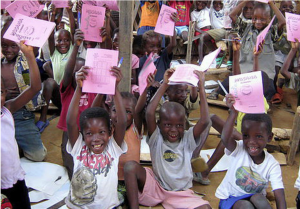Many moons ago when I was still a bright eyed CEP first year attending Internfest, I decided that for my internship I wanted to work with an organization that fostered sustainable development in rural Africa and Asia. After months of researching and applying, Jadora and I found each other through a mutual friend . . . and it’s been a love story ever since.
 Jadora was founded in 2008 by Don Tuttle, an experienced leader in conservation, biological research and ecosystem management. In the Lingala dialect native to Central Congo, the word Jadora means “peace in the forest.” The company is structured around two teams, the Seattle-based team where I work, and a Congolese-based ground team.
Jadora was founded in 2008 by Don Tuttle, an experienced leader in conservation, biological research and ecosystem management. In the Lingala dialect native to Central Congo, the word Jadora means “peace in the forest.” The company is structured around two teams, the Seattle-based team where I work, and a Congolese-based ground team.
What is Jadora?
The core mechanics of Jadora are simple: it generates forest carbon credits from standing forests in the Democratic Republic of Congo and sells them on the global carbon markets. It uses the revenue generated to compensate land stewards and drive sustainable change in the region.
While the mechanics are simple, the process of generating carbon credits is methodologically complex, capital intensive, and involves multiple stakeholders. To be effective in the region, the Congolese team has cultivated deep relationships with landowners and local communities since 2008. The local communities in the DRC have come to trust Jadora to provide expertise and support for large-scale forest management.
How Jadora Makes a Difference!
As a REDD+ (Reduced Emissions from Deforestation and forest Degradation) project, Jadora’s primary drive is to help local land stewards monetize and preserve their forests, to reduce global deforestation. That said, it takes the ‘+’ portion of REDD+ to heart, incorporating community engagement and development at the center of all project activities.
Every project that the team embarks on places very serious emphasis on being culturally sensitive and maintaining stakeholder integrity. Jadora takes the local landowners’, communities’, and governments’ trust in its methodology very seriously and uses only the most rigorous carbon accounting standards to verify and validate projects. Its Isangi Project has achieved a “double gold” rating from the Verified Carbon Standard (VCS) and Climate, Community & Biodiversity Alliance (CCBA), and all of its pipeline projects will live up to the same rigorous standards.
Drawing expertise from a multi-disciplinary team, Jadora’s approach is twofold: to provide local communities with the end-to-end service and guidance needed for carbon credit generation, and to work with relevant local authorities to improve socioeconomic conditions through sustainable development.
Jadora’s Environmental and Social Impacts
Climate change mitigation: Jadora’s Isangi Project protects 334,000 ha of primary forest from deforestation. It is expected to sequester ten million metric tons of carbon emissions over its lifetime. This is roughly enough to offset New York City for three months!

Improved Livelihoods: Currently, the Isangi project area includes 21 villages and 100,000 inhabitants. On-the-ground activities in this region have significantly improved access to education, improved agriculture and healthcare for local communities. Moreover, Jadora’s project activities are largely implemented by locally sourced and trained employees and Jadora is also working to promote micro-industries and micro-lending efforts in the region.
Biodiversity preservation: Of the roughly 11,000 forest plant species present in the region, 1,100 are only found in the DRC, and 69 of these species are currently threatened. 11% of the world’s bird species and 14 different types of primates are indigenous to the region. The forest is also home to critically endangered mega-fauna like the Forest Elephant, Black Leopard and Bonobo chimpanzee.
What I Do and Why I Love It
One of the best things about my internship is that I am part of a very small, close-knit team, and my responsibilities vary with the needs of the company. My main responsibility is to conduct policy research and compile reports for documentation and informed decision making, but some of my other duties include working on long-term company brand identity and assimilating presentations for potential buyers.
My first year coursework at CEP, particularly my Policy and Law courses have been very helpful in understanding the company’s procedures and conducting well-targeted research. As for the Communications course, I have thanked Caroline every day for the writing and presenting skills she ingrained in us.
Lastly, skills and duties aside . . . the main reason I love my job is because every day I work to empower 100,000 people and protect 334,000 ha of forest, and that makes me jump out of bed each morning with a smile.
